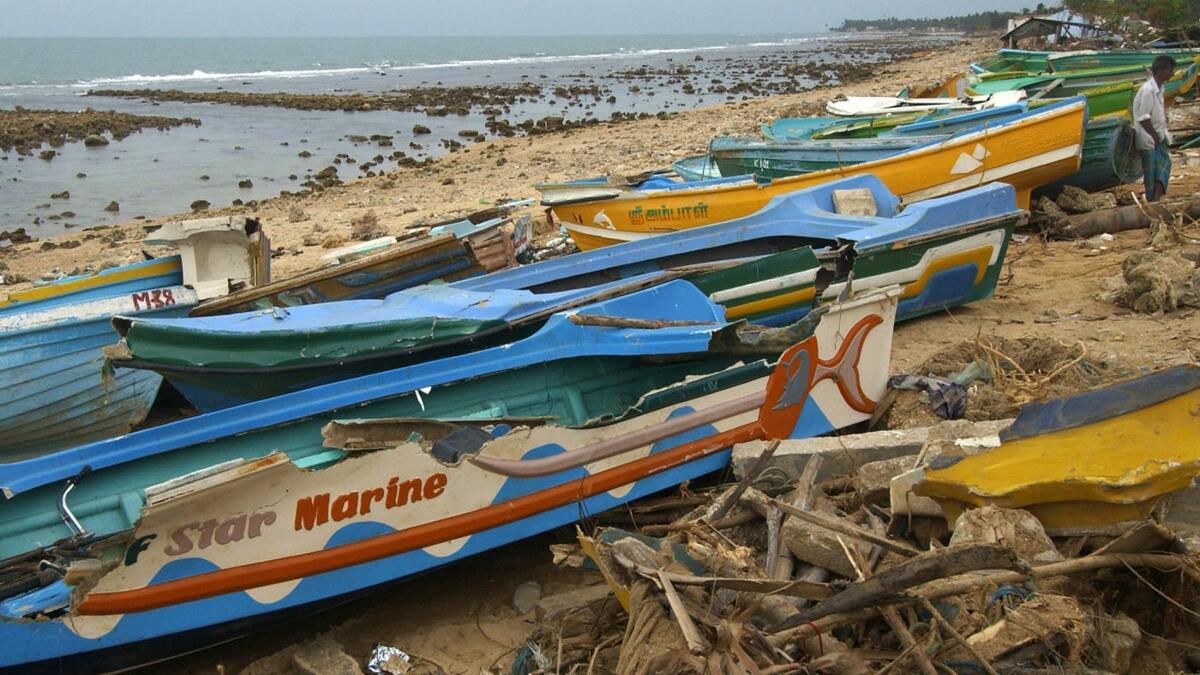The 2004 tsunami could have killed me. I escaped, but it changed my perspective

- Share via
I started shaking when I first heard about the tsunami that struck Indonesia in December. The reason? On Dec. 26, 2004, my sister Penny and I were washed ashore by the tsunami that started with a 9.1-magnitude earthquake off Indonesia’s Sumatra and generated a wave that spread across the Indian Ocean.
We were vacationing with a group of teachers on the southern tip of Sri Lanka. On that beautiful Sunday morning, Penny and I were headed to the beach. There was not a cloud in the sky; gentle waves lapped the shore where a few early-bird tourists sunned themselves.
We hiked parallel to the shore on top of a 12-foot-tall breakwater made of large black boulders. They were slippery, and we had to look down to watch our footing.
Just after 10 a.m., a giant wave suddenly slammed down on us, carrying us about 10 feet in the air and depositing us into the brush along the beach. It knocked the wind out of both of us.
When she could catch her breath, Penny yelled, “Marcia, we’ve got to get out of here!” She had experienced rogue waves in the U.S. Virgin Islands and thought this was one.
Shaking and soaked, we stood up and trudged through the wet sand, seaweed and debris, trying to go back the way we had come. The dry riverbed we had crossed that morning had become a raging torrent, carrying picnic tables, lawn chairs, umbrellas and every sort of trash. We considered fording it, but two hotel staffers frantically waved us back knowing we would have drowned in an instant.
I was still wearing my sneakers and had my fanny pack, but Penny had on only her bikini and wasn’t wearing shoes. Now we tried to fight our way through the jungle to get back to the hotel, but the brush was too dense and thorns scraped and scratched our legs and arms until they bled. We saw no path through it.
About 20 minutes later, the two men who had waved us back suddenly came crashing through the brush. They took us by the arm, and the four of us held hands as they led us along the raging river and put us in an open-bed truck that took us back to the hotel.
Still shaking with fright, Penny and I headed back to our cabin, hoping to clean up and grab breakfast. When we saw how much water was on the hotel grounds, we wondered why the gardeners had overwatered. Our little cabin had been flooded and furniture toppled. We still didn’t understand the magnitude of what had happened.
Soon we heard the first news about the tsunami. The hotel manager called for an immediate evacuation. We quickly packed our things and headed for the several hotel vans that would take us inland.
We traveled all day, going north through the center of the country. We were horrified by the devastation, but the scope still eluded us. The hotel driver took only our travel group in his van, seeking and finally finding a hotel with space for the 12 of us.
We stayed there for two days, glued to the tiny television in the lobby. Little of the commentary was in English so we didn’t know the extent of the disaster until we arrived in Colombo and our next hotel. Things became clearer there. Penny and I both trembled from the shock.
We had come so close to a sudden and senseless death. Why had we been so fortunate to survive? At our original hotel we had been upgraded to a fancier one several miles south. We learned later that about 200 of the guests who had been staying where we would have been were swept away.
The unfathomable tragedy killed more than 225,000 people, and it changed everything, including my view on life.
I am grateful for each day and try to live my life to the fullest, a perspective that was reinforced 18 months later when Penny, my kid sister, the only person who could truly understand what happened to us, died unexpectedly.
I miss Penny every day. But I go on because this second chance is a gift. What happened to me — to us — hasn’t diminished my desire to see the world. In fact, come sit down beside me and let me tell you about my recent trip to Israel.
Departure Points explores the ways traveling changes us, whether it’s a lesson learned or a truth uncovered. You may submit a first-person essay of 700 or fewer words to travel@latimes.com using “Departure Points” in the subject line. Please include your first and last names and your contact information for editorial consideration.
More to Read
Sign up for The Wild
We’ll help you find the best places to hike, bike and run, as well as the perfect silent spots for meditation and yoga.
You may occasionally receive promotional content from the Los Angeles Times.






